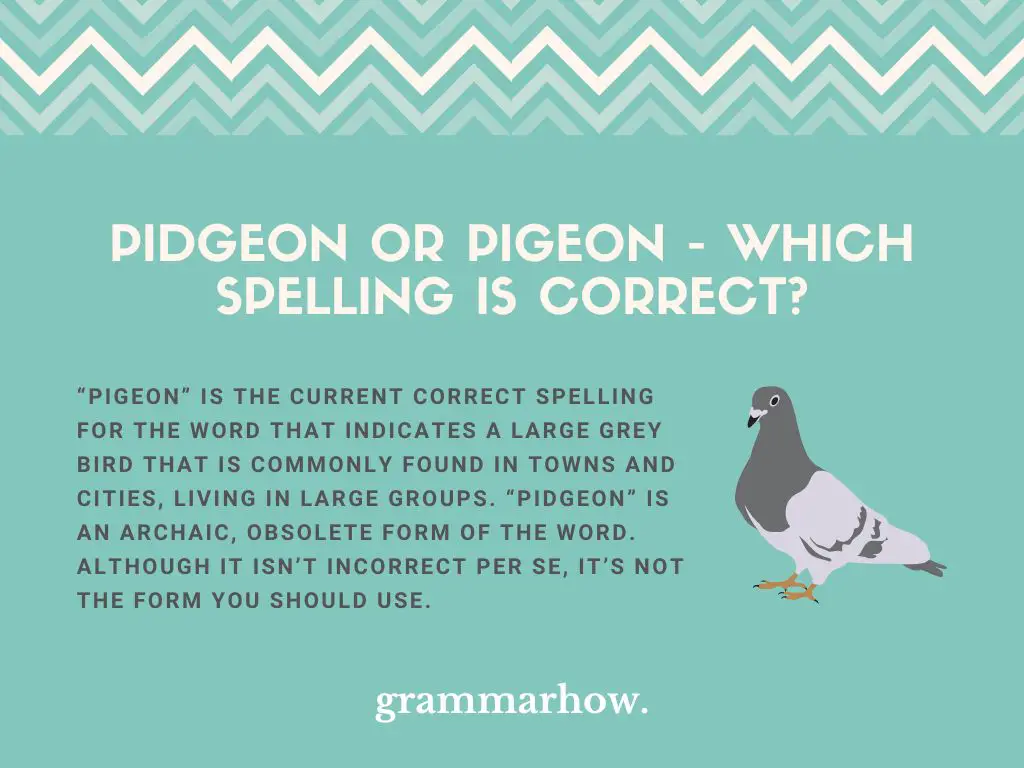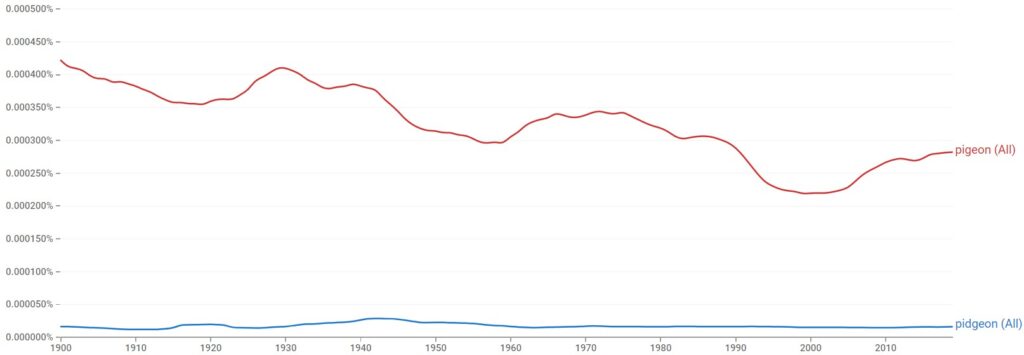Where you live, are there many “Pidgeons” on the streets? Or should we say “Pigeon”?
We want to know what’s the correct spelling for this word. Which form should we use? And which one should we avoid?
Pidgeon or Pigeon – Which Spelling Is Correct?
“Pigeon” is the current correct spelling for the word that indicates a large grey bird that is commonly found in towns and cities, living in large groups. “Pidgeon” is an archaic, obsolete form of the word. Although it isn’t incorrect per se, it’s not the form you should use.

Take a look at some examples:
- The park is full of pidgeons. (archaic)
- The park is full of pigeons.
Although we won’t go as far as stating that “Pidgeon” is an incorrect form – especially because in rare instances there are still people who use it -, we’ll make the following clear: “Pigeon” is the correct spelling which is considered appropriate to be currently used in the English language.
Always prioritize using “Pigeon” over “Pidgeon”.
Pidgeon
“Pidgeon” is an archaic spelling of the word we currently spell as “Pigeon”. We cannot affirm this is an incorrect form because it has been used in the past and there might still be people around that prefer to use the word in this form.
We must state clearly, though, that the current appropriate way to spell this word is “Pigeon” and not “Pidgeon”.
Is “Pidgeon” a word? Neither The Cambridge Dictionary nor The Merriam-Webster Dictionary recognizes “Pidgeon” as a word we should use in our daily communications. Keep in mind that this is an archaic form that differs from the one which is currently accepted.
Let’s take a look at some examples that use the word “Pidgeon” as an alternate form of “Pigeon”.
- Ciara has a pet pidgeon. (archaic)
- Ciara has a pet pigeon.
- We’re feeding the pidgeons at the park. (archaic)
- We’re feeding the pigeons at the park.
- What are pidgeons supposed to eat? (archaic)
- What are pigeons supposed to eat?
We won’t go as far as saying the “Pidgeon” is incorrect. We want to reinforce, however, that this isn’t considered the correct appropriate form of the word you should be using today. With that in mind, always prioritize the form “Pigeon” over “Pidgeon” in your sentences.
Pigeon
“Pigeon” is a fairly large grey bird, frequently seen in big cities. It’s usually a bird of the Columba Livia domestic species.
This is the definition of “Pigeon” we find in The Cambridge Dictionary: “a large, usually grey bird that is often seen in towns sitting on building in large groups, and is sometimes eaten as food”.
We’re not so sure about the food aspect of the definition, because in many places it’s considered to be a dirty bird that carries diseases and shouldn’t be approached. But we also understand this is a concept that varies depending on the local culture.
Take a look at some examples:
- This city is full of pigeons.
- Look at all those pigeons!
- The pigeons quickly swarmed the area where I dropped my food.
- The biologists capture some pigeons to tag them and study their behavior when released.
- Mark hates the pigeons.
Which Is Used the Most?
Which one of those forms is used more often, “Pidgeon” or “Pigeon”? Take a look at the graph from Google Ngram Viewer below.

This is an interesting graph. “Pigeon” is the spelling of the word that is used more frequently, according to the graph.
The graph shows, on the other hand, that “Pidgeon” is still used now and then. The difference in usage is quite considerable when comparing “Pigeon” and “Pidgeon” and there’s no denying that “Pigeon” is the predominant form.
Still, we can’t ignore the fact that some people still use the form “Pidgeon”. Therefore, here’s our recommendation: be respectful of those who prefer to use the word “Pidgeon” but always prioritize using the current form “Pigeon” in your sentences.
Final Thoughts
“Pigeon” is considered the correct spelling to indicate the large grey bird that is commonly found in towns and cities, and usually lives in large groups. “Pidgeon” isn’t incorrect, but is an archaic form. You should always prioritize using “Pigeon” and avoid the obsolete form “Pidgeon”.

Martin holds a Master’s degree in Finance and International Business. He has six years of experience in professional communication with clients, executives, and colleagues. Furthermore, he has teaching experience from Aarhus University. Martin has been featured as an expert in communication and teaching on Forbes and Shopify. Read more about Martin here.

